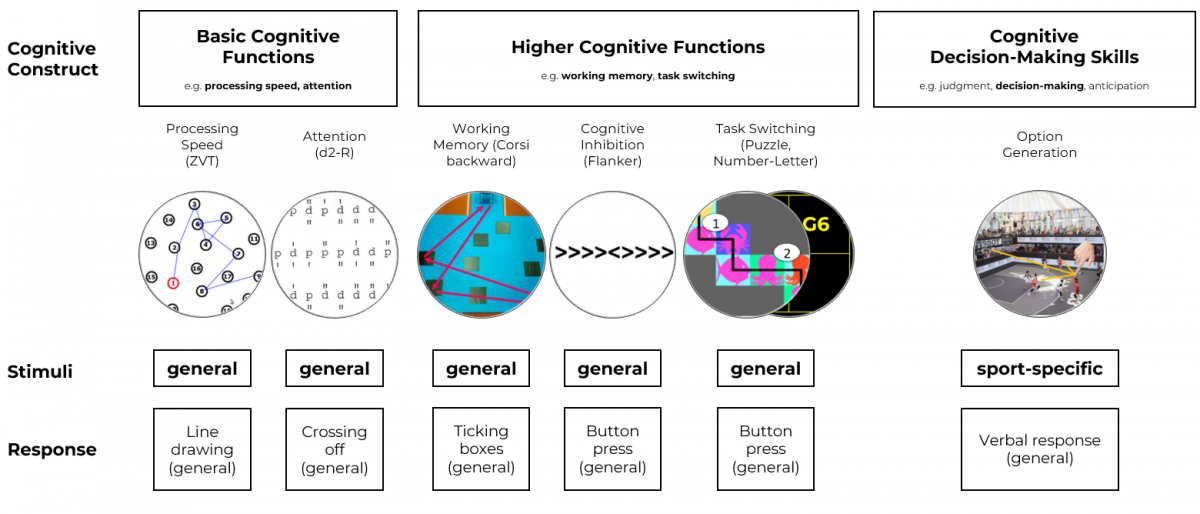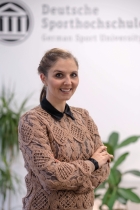Thinking gold: the link between cognition and performance in olympic athletes
Editor: Ruud den Hartigh
Editorial Assistant: Sameeksha Shukla, Jana Dreston
This article has also been translated into German, Italian, and Dutch.
In Olympic athletes, superior physical performance is clearly evident on observation. The non-visible cognitive processes also contribute to successful performance, yet they are still weakly researched and their mechanisms are unclear. With this article, we will provide insights into state-of-the-art research on the cognition-performance link in sports, focusing on elite athletes preparing for the Olympic Games. To do so, we will illustrate challenges associated with cognitive testing in the
field of competitive sports, present solutions, and pinpoint how developing sport-specific vs. general cognitive measures can pave the way for individually tailored cognitive interventions.
For Olympians striving for peak performance on the world’s greatest stage, high levels of individualized preparation are crucial because subtle differences profoundly impact performance outcomes [1]. Preparation that only consists of practice and physical training would, however be considered too narrow. It should rather be based on a holistic approach including nutrition, genetics, blood health, motor skills, social life, and cognition. Current research approaches therefore place special emphasis on interdisciplinary cooperation, focusing on individualized athlete development in multiple areas and their possible interactions. Often underestimated due to being less visible than physical performance, yet worth respecting because they are pivotal in athletic performance, are cognitive processes, which will be the focus of this article (Figure 1).
 Image 1: Multidisciplinary measures for athlete development with a particular focus on cognitive functions
Image 1: Multidisciplinary measures for athlete development with a particular focus on cognitive functions
Cognitive demands in competitive sports are manifold, such as concentration, multitasking, decision-making, or
working memory performance [2]. Cognitive research in sports theoretically differentiates cognitive skills (i.e., effective use of
domain-specific knowledge when performing) from cognitive functions (i.e., general, effortful cognitive mechanisms relevant to
goal-directed action). Functions have been further differentiated into basic cognitive functions, higher cognitive functions, and cognitive decision-making skills [2].
Especially in interceptive and team sports, cognition has been shown to play a central role in developing extraordinary sports expertise [2]. In the following, we take basketball as an example to enhance our understanding of how cognition intersects athletic expertise. Basketballers must constantly make split-second decisions while simultaneously executing complex physical movements. During a game, important basic cognitive functions enable paying attention where fellow players are positioned or process constantly incoming information such as shouts by the coach. Higher cognitive functions further include the updating and
retrieval of information from
working memory, the inhibition of responses, and task switching when circumstances change. Besides, players need specific cognitive skills, such as the ability to anticipate opponents’ behavior or to generate options for their own possible next moves, and make decisions under pressure (see Figure 2). Join us as we explore the role of cognition and cognitive diagnostics during a special training day for the Olympic national team player Sofia, who is part of the interdisciplinary research project “in:prove” aiming at improving athletic performance through individualized diagnostics and interventions.
Olympic preparation, of the mind?
7.00am: Sofia enjoys breakfast before heading to the sports hall.
7.15am.:1st Basketball training session. After warming up, the first cognitively-demanding exercise involves numbered and differently-colored cones set-up in a square. Sofia stands in the middle, dribbling. Once the coach shouts out a number, she has to touch the respective cone with her non-dribbling hand and return to the starting position as fast as possible. After a few minutes, the rule shifts to responding to cone colors, before it changes again, requiring Sofia to touch cones with her left hand for numbers and her right hand for colors. This exercise demonstrates that many of the cognitive constructs captured by the diagnostics during that day will be relevant: She has to focus her attention on the cones and quickly process what the coach commanded (processing speed), remember the position of the cones (
working memory), adapt flexibly to changing rules (task switching), and inhibit “wrong” responses (i.e., using the “wrong” hand).
8.00am: Intro research project “in:prove”. After being welcomed by the principal investigator of the project, all players start with a test challenging cognitive processing speed. In this test, athletes work under time pressure and have 30 seconds for each of the four trials to connect numbers from 1 to 100 as fast as possible. Athletes then spread to various research stations, including motor performance tasks (8.15), menstrual cycle interviews (8.35), blood sampling (8.55), and psychosocial questionnaires.
9.15am: Cognitive testing. Sofia undergoes three computerized tasks to assess basic cognitive functions like processing speed and visual attention, as well as higher cognitive functions like
working memory or cognitive flexibility (see Figure 2). These tasks involve navigating through letters with different patterns or puzzles or responding to flashing geometric shapes or letter-number combinations as accurately and as fast as possible. Additionally, Sofia’s decision-making skills are evaluated through a basketball-specific option generation
paradigm. She watches video scenes of players performing in Olympic basketball games that abruptly stop and has to instantly generate options for what she, as a player, could have done next and decide among those which option she would actually execute.
 Image 2: Illustration of cognitive functions and the way they are assessed in the project
Image 2: Illustration of cognitive functions and the way they are assessed in the project
9.45-11.15am: 2nd Training session.
11.15am: Lunch.
12.00-13.15pm: Sofia completes four more assessment stations.
3.00pm: The first training camp try-out. After a long assessment day demanding concentration, she is able to demonstrate cognitive skills on the
field and to show the same ability to play as she would do after just waking up refreshed and full of energy.
5 days later: The individual outcomes of all interdisciplinary assessments are summarised in traffic-light-labelled avatars (Figure 1). This visualization tool helps researchers discuss with athletes and coaches where abilities are above the norm (green), within a normal range (yellow), and in need of improvement (red), guiding the development of potential individualized interventions.
This day’s schedule shows that Olympic preparation extends beyond just basketball practice, encompassing also interdisciplinary diagnostics and individualized interventions not directly related to basketball. As researchers, we aim to provide insights into the “behind-the-scenes of testing”, where diagnostics are carefully composed and interventions tailored individually based on results.
Behind the scenes I: Cognitive diagnostics in the field
Selection and development of cognitive tasks. Before research projects start, researchers, coaches, and the association’s research coordinators meet and discuss the interests of the specific sports association, also taking into account the cognitive profile of the respective sport discipline.
Sport psychology differentiates the cognitive components skills [3] from the expert performance approach [4]. According to the first, long-term practice of physical activity, together with continuously progressing mental demands towards elite level, positively influences
domain-general measures of cognitive performance. In contrast, the expert performance approach argues that elite athletes outperform novices and laypersons primarily in sport-specific cognitive tasks. One crucial difference thus is the conceptualization of cognitive measures: While research following the cognitive component skill approach mostly implements
domain-general cognitive tasks, research following the expert performance approach uses sport-specific cognitive tasks [2].
Domain-general means that stimuli (e.g., symbols, numbers, geometric shapes) and responses can be decoded and executed by basically anyone, not requiring specific knowledge or experience. For example, in the “Flanker task”, stimuli are arrows pointing to the left surrounded by two arrows pointing to the right (and vice versa) (see also Figure 2). The direction of the middle arrow needs to be decoded and indicated by a button press. In a computerized “Corsi
working memory task”, stimuli are a series of squares lighting up on screen. Participants have to memorize the order and touch the blocks in the same or reversed order (for an extensive overview of
domain-general cognitive tasks see [5]).
Sport-specific tasks, however, require sport-specific knowledge and/or experience, because stimuli (e.g., pictures, videos of a sport situation), task environment (e.g., instruction, presentation size, position of participant), and (sometimes) responses (e.g., pass, whole-body movement) are sport-specific. For instance, in soccer-specific flanker tasks, five players are presented on a screen, with the middle player being the target item and the surrounding players being (potential) distractors [6]. The participating soccer player stands in front of the screen, a ball at his/her feet having to pass towards the target
goal area (left/right) the middle player looks at. In sum, even when relevant cognitive constructs have been identified, selecting appropriate diagnostic tasks is not trivial due to their various possible designs [7].
Standardized
domain-general cognitive measures are readily available, often for free (psytoolkit or OpenSesame). However, as sport-specific measures address specific applied diagnostic or research needs, they require close
collaboration between researchers and sports professionals to select representative (video) stimuli for meaningful cognitive evaluation, as well as
significant resources and time-consuming validation procedures. Currently, there is no open task battery of sport-specific tasks measuring various cognitive constructs in different sports, but this would be a valuable future
goal for research and practice alike.
Challenges associated with cognitive testing in the
field. Conducting cognitive testing in the
field (e.g., during training camps) offers insights into cognitive processes as they unfold in natural settings. Yet promising, researchers must navigate some challenges to ensure the validity and reliability of their findings.
Main quality criteria (reliability, validity, objectivity): Cognitive tests must be reliable across multiple testing sessions to accommodate variations in performance influenced by demanding training schedules or general fatigue. Cognitive tests should further align with sport-specific cognitive demands and training objectives. Validity also involves considering the potential impact of physical or mental fatigue [8], ensuring that the tests accurately reflect the athletes' cognitive abilities under realistic conditions. Objectivity is crucial for fairness and consistency across diverse populations, requiring standardized procedures, clear instructions, and uniform test environments, especially with elite athletes who may have varying levels of experience with cognitive testing.
Standardization and fairness:
Field-testing in sports halls and adjacent rooms involves challenges, such as noise, unforeseen disruptions/distractions, intermittent training units, or varying light and temperature. Researchers must find space to allow cognitive diagnostics to be conducted as standardized as possible, e.g., including devices like noise-cancelling headphones to minimize distractions.
Reasonableness: Recognizing the limited attention span and decreasing engagement rate of individuals across time, researchers must ensure that cognitive tests focus only on relevant
factors and are minimized in duration.
Economy: Efficient resource usage, in terms of time and materials, without compromising assessment quality [9], is crucial. Especially during Olympic preparation when training schedules are so tight that testing time is limited. Balancing brevity and comprehensiveness is a delicate task, as overly lengthy tests may not only strain attention span but also lead to delays in the whole diagnostic process.
Scaling: Comparing cognitive task results to age-
gender-matched norms is common, yet it is important to recognize that athletes may possess exceptional fitness levels. Distinguishing whether cognitive differences stem from genuine variations or athletes' superior physical condition is a challenge. Scaling methodologies must adjust for athletes’ elevated baselines, to accurately assess their cognitive abilities [10].
Data control: Ensuring data integrity in the
field is essential. Besides a secure data base, it is essential that athletes agree actively with whom (e.g., national coach, physician) data can be shared, and with whom not. This is a free choice and the athletes’ information is carefully protected.
Behind the scenes II: Designing and evaluating cognitive interventions
Cognitive diagnostics and individual feedback enable the identification of individual developmental potential. Thereupon, the goal of the project is to develop individually tailored intervention plans, considering both the individual scores on the cognitive task and the specific demands of the sport. For instance, training cognitive flexibility may be more significant for a basketball player navigating dynamic game environments than for a gymnast performing routines. In any case, very few standardized interventions targeting specific or multiple (sport-specific) cognitive functions exist. One possible approach involves daily or weekly repetition of general cognitive tasks (e.g., multiple object tracking) for some time to assess whether sports performance improves, too. Such transfer effects refer to skills which are not directly trained and can possibly manifest in similar tasks (near-transfer) or in game-like situations (far-transfer) [11].
However conflicting results about near- and far-transfer effects, fueling the urge for the development of sport-specific cognitive tasks and interventions particularly. We favor an alternative strategy not involving interventions based on general tasks, but rather constantly exercising and boosting cognitive demands during regular training. For instance, by increasing the number of decisions the athlete is allowed to make, by creating more dual-task demands or by implementing training tools like ball machines, large projection screens with multiple target zones to react to, or virtual- and augmented-reality
simulations. We favor this, because we expect that through sport-specific training, cognitive demands in competitive situations will be handled more effectively, benefitting superior performance even in tournaments such as the Olympics.
Despite
intervention types, a main challenge in elite sports lies in gaining acceptance from coaches and athletes. Acceptance is more likely once individual needs are acknowledged and translated into tailored individual approaches with scope and extent aligned with the schedules of all parties involved. Further, awareness about the added value of
domain-general and sport-specific diagnostics and transparency about cost-benefit ratios are needed. Cognitive online interventions represent low-cost alternatives that do not disrupt training schedules and may have a positive cost-benefit ratio, but are challenging to control for compliance. Sport psychologists may also achieve a favorable cost-benefit ratio by focusing on single cognitive functions essential to the sport instead of applying multi-purpose test batteries.
Lastly, the evaluation of individualized interventions is challenging, especially in elite sports. In terms of formative evaluation, the client-tailored interventions will be accompanied. This is done by documenting the interventions as case studies [12, 13]. In developing interventions within a
competence team consisting of researchers, national coaches, sport scientists, and psychologists, it is ensured that specific performance parameters can be addressed in training (practice) sessions on and off-
field. This co-productive approach [14] in general aims at integrating multidisciplinary expertise. The summative evaluation consequently integrates the feedback of the stakeholder, integrating competition and training data. In that way, athletes and coaches will benefit most from sport psychological research and support.
Make the Olympic mind “think gold”!
So, how do we actually help athletes to “think gold”? Interdisciplinary research emphasizes individualized athlete development across multiple domains and possible intricate interactions between them. Most recent meta-analyses and our experience further show that carefully considering cognitive processes is crucial, as they significantly impact athletic expertise and performance outcomes. Effective cognitive diagnostics and tailored interventions, integrated seamlessly into training routines, offer promising avenues to optimize athletes' cognitive abilities, enhancing their readiness for peak performance on the world stage. As researchers, we hope for more research investing in testing the effectiveness of individual cognitive interventions, and as applied sport psychologists, we are very much invested in training the Olympic mind to be prepared for an outstanding performance in Paris 2024.
Acknowledgements
ENG: This project was supported with research funds from the Federal Institute for Sports Science (BISp) on the basis of a decision by the German Bundestag; grant number 081901/21–25.
Bibliography
[1] K. Zentgraf and M. Raab, "Excellence and expert performance in sports: what do we know and where are we going?," Int. J. Sport Exerc. Psychol., pp. 1-21, 2023. doi: 10.1080/1612197x.2023.2229362.
[2] A. Kalén, E. Bisagno, L. Musculus, M. Raab, A. Pérez-Ferreirós, A. M. Williams, D. Araújo, M. Lindwall, and A. Ivarsson, "The role of domain-specific and domain-general cognitive functions and skills in sports performance: A meta-analysis," Psychol. Bull., vol. 147, no. 12, pp. 1290-1308, 2021. doi: 10.1037/bul0000355.
[3] M. W. Voss, A. F. Kramer, C. Basak, R. S. Prakash, and B. Roberts, "Are expert athletes ‘expert’ in the cognitive laboratory? A meta- analytic review of cognition and sport expertise," Appl. Cognit. Psychol., vol. 24, pp. 812-826, 2010. doi: 10.1002/acp.1588.
[4] K. A. Ericsson, "How the expert performance approach differs from traditional approaches to expertise in sport: In search of a shared theoretical framework for studying expert performance," in Expert Performance in Sports: Advances in Research on Sport Expertise, J. L. Starkes and K. A. Ericsson, Eds. Human Kinetics, 2003, pp. 371-402.
[5] A. Diamond, " Executive functions," Annu. Rev. Psychol., vol. 64, pp. 135-168, 2013.
[6] L. Musculus, F. Lautenbach, S. Knöbel, M. L. Reinhard, P. Weigel, N. Gatzmaga, A. Borchert, and M. Pelka, "An assist for cognitive diagnostics in soccer: Two valid tasks measuring inhibition and cognitive flexibility in a soccer-specific setting with a soccer-specific motor response," Front. Psychol., vol. 13, Art. no. 867849, pp. 1-15, 2022. doi: 10.3389/fpsyg.2022.867849.
[7] P. Furley, L. Schütz, and G. Wood, "A critical review of research on executive functions in sport and exercise," Int. Rev. Sport Exerc. Psychol., pp. 1-29, 2023. doi: 10.1080/1750984X.2023.2217437.
[8] D. Borsboom and G. J. Mellenbergh, "Test validity in cognitive assessment," in Cognitive Diagnostic Assessment for Education: Theory and Applications, J. P. Leighton and M. J. Gierl, Eds. Cambridge University Press, 2007, pp. 85-115. doi: 10.1017/CBO9780511611186.004.
[9] H. Moosbrugger and A. Kelava, Testtheorie und Fragebogenkonstruktion. Springer, 2011.
[10] C. Adjetey et al., "Economic evaluation of exercise or cognitive and social enrichment activities for improved cognition after stroke," JAMA Netw. Open, vol. 6, no. 11, Art. no. e2345687, 2023. doi: 10.1001/jamanetworkopen.2023.45687.
[11] M. T. Fleddermann, H. Heppe, and K. Zentgraf, "Off-court generic perceptual-cognitive training in elite volleyball athletes: Task-specific effects and levels of transfer," Front. Psychol., vol. 10, Art. no. 1599, 2019. doi: 10.3389/fpsyg.2019.01599.
[12] A. G. Andersen, A. Miles, C. Mahoney, and P. Robinson, "Evaluating the effectiveness of applied sport psychology practice: Making the case for a case study approach," The Sport Psychologist, vol. 16, no. 4, pp. 432-453, 2002. doi: 10.1123/tsp.16.4.432.
[13] R. Keegan, S. Cotterill, T. Woolway, R. Appaneal, and V. Hutter, "Strategies for bridging the research-practice 'gap' in sport and exercise psychology," J. Sport Psychol., vol. 26, no. 4, pp. 75-80, 2017. [Online]. Available: https://www.rpd-online.com/article/view/v26-n6-keegan-cotterill-woolway-....
[14] B. Smith, O. Williams, L. Bone, and the Moving Social Work Co-productive Collective, "Co-production: A resource to guide co-producing research in the sport, exercise, and health sciences," Qual. Res. Sport Exerc. Health, vol. 15, no. 2, pp. 159-187, 2023. doi: 10.1080/2159676X.2022.2052946.
Images
Image 1 & 2: self-created by the authors
Image 3: Mohamed_hassan via pixabay https://pixabay.com/photos/winning-success-achievement-sport-2829615/ (edited)
All pictures are self-created. The authors obtain the rights to reprocuce them.






